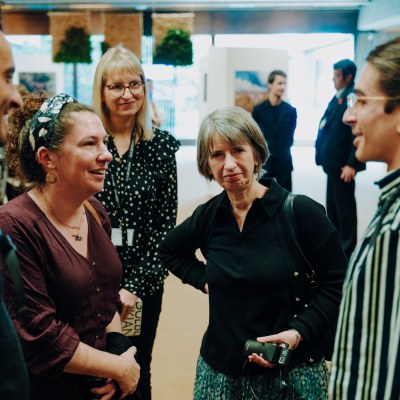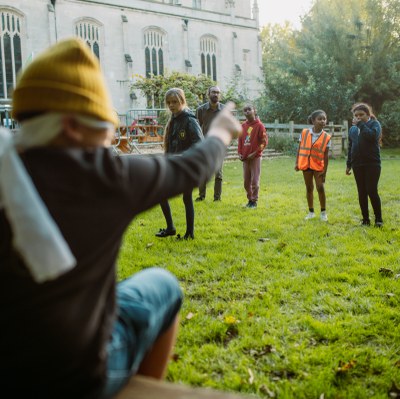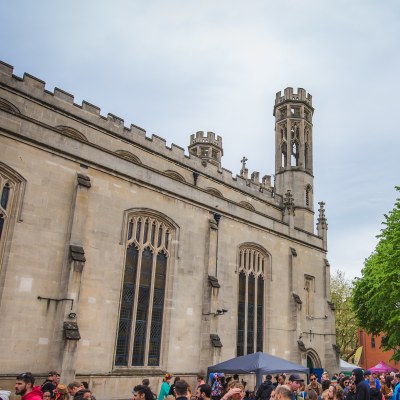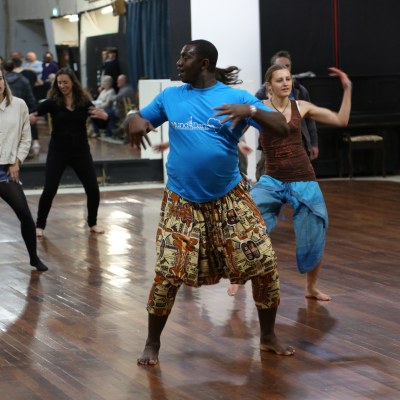Q&A with Trinity
Could you give a brief history of the venue?
The Trinity Centre is a much-loved historic landmark and has been hosting live-music events since it ceased to be a church in 1976. The venue was pivotal in the 80s Punk, Reggae and Ska scenes, with performances from New Order, Eek-A-Mouse and post-punk stalwarts The Stingrays performing alongside newcomers U2. A predominant Bristol music venue in the 90s, the venue quickly established a reputation as the birthplace of 'the Bristol Sound', for its role in early performances from Massive Attack, Portishead, to international artists Public Enemy.
Today the venue is host to performances from both of home-grown and international talent and, with performances from the likes of Damon Albarn and Duran Duran, is fast becoming a space for larger touring artists to reach their fan-base in an intimate setting.
What is Trinity's USP?
As a former converted church the space offers a unique setting with great acoustics. Alongside our main hall, Fyfe Hall - our newly renovated upstairs hall-space - provides a great alternative for acoustic performances. The venue has a great reputation as one of Bristol's best venues, helping to attract audiences from Bristol and beyond.
Who is Trinity owned/operated by?
Trinity Community Arts is a registered charity with a trading subsidiary running the centre on a long-term lease. As a community asset the building itself is owned by Bristol City Council. The team running the venue have many years experience in the delivery of live-music events and are well linked with other venues, groups and artists across the city.
What recent music events have you held and what's been your biggest music show to date?
Notable performances this year have been from American singer-songwriter Banks, indie-rockers British Sea Power, electronic-rock from Awolnation, choral-symphonic-pop The Polyphonic Spree, an epically loud performance from noise rock band Swans and international drum and bass musician LTJ Bukem.
Any particular promoters/companies you work with?
Promoters include DHP, Metropolis and Live Nation – we also work a lot with the team at Fleece Bristol who have promoted some great acts at Trinity, such as tUnE-yArDs. There are a number of local promoters we work with including newcomers Goldtopp and the fantastic Teachings in Dub crew, who pull together the best Sound System nights in the South West. Most recently they brought Mungos Hi-Fi - a bunch of Scottish guys who turn up in their kilts and tweed and bring sounds from the original Jamaican sound system tradition - performing alongside Classic Wonder Vetrans, who made their name during the 90s at the peak of the dancehall scene.
How many live music events, on average, do you hold a year?
We hold around 50 events every year and this number is growing year-on-year. With the addition of our new upstairs hall space, we anticipate this number increasing.
How has live music been for you over the past year? Where are we heading - do you anticipate an increase in live music at Trinity?
Audiences are spoilt for choice where live-music is concerned. It's not enough to just like the artist's music - they have to put on a great performance. One of the most charismatic performers we've had was Lianne La Havas - she really reached out to the audience and everyone really felt part of that energy. People want to feel part of something – a shared experience that goes beyond the tracks themselves. With millions of tracks being readily downloadable, it's what makes the live-music scene so special.
Are you seeing any particular trends of musical genres at Trinity, or what works best with your audiences?
With a venue our size we tend to see artists 'on their way up' so to speak. You always get the sense that, once you've seen them at Trinity once, you'll be lucky to catch them again in such an up-close-and-personal setting. That's what makes the fan-club nights so epic! Reggae, electronic and Americana feature quite heavily – music that stems for the DIY scene, coming up through independent channels.
How would you describe your 'typical' audience?
Trinity has such a range of acts that it's hard to say what our typical audience is. I think there is an audience base that has a love of the venue. They're probably 30s-40s with a couple of kids that can still remember the time they came to Tribe of Frog late 90s when 2000+ people were packed into the venue and sweat was pouring off the ceiling! Lots of people have a lot of love for the space from that era in particular. Others will come along for a sound-system clash, or to see Seth Lakeman, and have a very different perspective. When you have a gigs in one week with artists such as Therapy? and Morgan Heritage in one week and then a Cameroon National Day with live music and traditional dance you think, wow these are very different audiences!
Do you ever have large well-known musical names wanting to play a warm-up or more intimate show?
Damon Albarn appears to be a fan of the venue which is great! He's performed here as The Good, The Good, The Bad And The Queen and, in 2010 as part of a Gorillaz fan-club tour and most recently to coincide with the release of Everyday Robots. This in particular was special as they needed someone locally to MC for the Clint Eastwood track. So a Bristol based MC, K*Ners, turns up in his work uniform, does the rehearsals and then bam! A few hours later he's performing live on stage with Damon. That was something special.
What threats/risks are out there for live music at arts centres?
Money, lack of money, venues competing for acts, audiences - the cost of putting nights on increases, but there's only so far you can push a gig-goer in terms of ticket price. But people still want the live experience so I think venues will be ok as long as they have a good sound and a good reputation. Even if you like the artist, a bad experience at a venue can put you off going back there.
Does the music industry need to do more to support live music at arts centres? If not the music industry, who else should be supporting arts centres?
We could see more involvement from the music industry in terms of supporting young talent. There are mechanisms there such as BBC Introducing, but it's getting that live-music presence that can be challenging for a new artist. Businesses in the creative industries and businesses more widely could support arts centres. It's where people have a lot of memorable experiences and a place where businesses could reach new markets. Last year we had a great gig with Aar Maanta's as part of his UK tour, brought to us by a local promoter. Bristol has a large Somalian community and it was the first time a musician from Somalia was touring the country. We were rammed! It was a great night and there's an audience there that certainly wants more, it's just finding and programming the right acts and having the resources to put behind something of this scale.
Do you think it's the role of the arts centre to support up and coming musical talent?
Absolutely. But it's finding out the best way to do this. We get calls all the time from people wanting to perform at the venue, but they don't have a track record. We're a 600 capacity venue so if someone's only going to pull 50 or 100 people then that's not the best way to support them in their development. I think it's about venues linking up a lot more and promoters being willing to use local support either in place or alongside their current support.
What marketing methods do you use to attract audiences to live music events?
We place ads in local publications such as Crack, Bristol Live Magazine and Metro. We also push online quite heavily on multiple listings sites and our own website, which is currently undergoing a facelift. Promoters will do their own marketing and we'll flyer and poster in other venues. Our Twitter and Facebook followers have grown rapidly and this seems to be a great way of letting people know what's happening.
Do you live stream your music events, or any plans to?
Not yet but we have talked about it. There are some Bristol based people who are keen to make this something Trinity could offer – a sort of 'Late Night With...' as a regular broadcast, but I think it's a way off – plus you need the buy-in from the artists and their team. It's not always something people are going to want to do, but it is a great way of reaching new audiences.
If you could make one prediction for innovation in live music at arts centres, what do you think will become popular/will we see more of soon?
More collaborative works where live-music takes place alongside other performing arts – dance, circus, theatre. More live-music happening in unique settings and larger artists performing in intimate venues to reach out to their core audience and test new material.
How have ticket sales been for your live music events over the past year? Have you seen an increase?
Ticket sales have been very good. That's thanks to working with established promoters who know what they're doing and can help to ensure a night's success. Sometimes they've been too good – we've lost a couple of nights where they've sold out early and moved the gig to a larger venue in Bristol. It's a bit disappointing - but then I guess that's business!
Are there any bands or artists that you'd love to have play a show at Trinity?
Well, Prince has been doing a spate of fan-club nights in smaller London venues, so it would be amazing if the South West could get a taste of the action! Failing that, I'd love to see a Bristol Sound revival night with Tricky, Massive Attack and Portishead. K'naan performing Wavin' Flag live for our local audience would be brilliant. Requests from the Trinity Team include Di Antwood, Beck, Pixies, Arcade Fire, These New Puritans, Kraftwerk, Indigo Girls, David Byrne – in fact, anyone from Talking Heads. So, if anyone's reading and would like to make it happen, please give us a shout!
What changes have there been to your venue over the last year? Are there any plans for significant developments over the next year?
The biggie has really been the renovation of our upstairs hall – Fyfe Hall – we've taken essentially a rather large, cold, echoy box and turned it into a beautiful hall with stained glass windows, underfloor heating and sprung wooden floor. The addition of full-height drapes have resolved acoustic issues making it a stunning setting for live-music sets.
Next steps will be to invest in our sound-system and in some much needed ventilation – now we're getting busier and with good weather it can all feel a bit clammy at a sell-out performance. With a big old converted church it's all about 'that's great, now what's next?'.
Anything else you'd like to mention?
We're working on projects that give more opportunities for upcoming artists to perform and build their audience and their links with other artists, promoters and organisations.
I think artists understand that when they visit Trinity, they are playing somewhere a bit different, somewhere where art forms cross over with community activities all under one roof – and we want to find more ways of making this happen and in a more meaningful way.
Our next stage is to support opportunities for the creation of new music from Trinity - Some of this comes through new initiatives such as partnerships with Tomorrows Warriors and their new Connexions workshops, as well as proposed residency and performance programme for 2015.
Watch this space.








